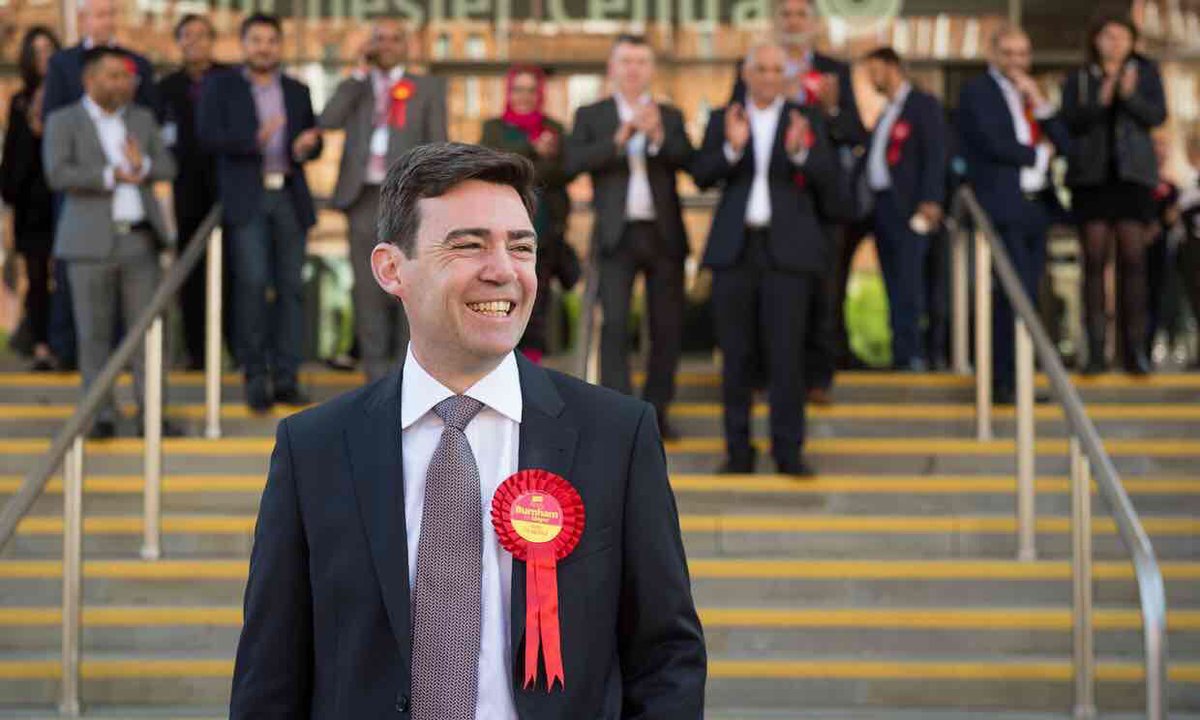A disastrous showing in the local elections for the Labour Party last week included shock mayoral defeats for the Co-operative Party – but Andy Burnham took the Manchester post by a comfortable margin.
The Conservatives gained 563 seats, and control of 11 councils. Labour lost 382 seats, and control of five councils, including strongholds like Glasgow. The Liberal Democrats lost 42 seats, UKIP lost 145; and, in Scotland the SNP lost 7. Plaid Cymru gained 33 seats in Wales.
However, Labour/Co-op candidates in the council elections bucked the trend, with 104 councillors elected across the UK – up from 97 when these elections were last contested in 2012 and 2013.
Of these, 14 were elected in Wales (down 5 on 2012), 31 were elected in Scotland (up 19 on 2012), and 59 were elected in England (up 7 on 2013).
And there was good news for the Party in Manchester, where Labour/Co-op mayoral candidate Andy Burnham cruised to victory with 63% of the vote.
Mr Burnham has pledged measures to support co-operativism in the region, giving it a minister for co-ops and mutualism.
He was involved in establishing Supporters Direct, which helps fans to set up democratic co-ops – or supporters’ trusts – and has voiced his support for what “mutual support and collectivism could bring in the modern world” and called on businesses to look at “models of shared ownership and profit-share schemes”.

A Co-op Party spokesman said: “We’re looking forward to working with Andy Burnham and his new team to continue developing the Party’s policy work with the new devolved authorities.
“We’ll be looking to build on our recent roundtable with Ted Howard from Cleveland Ohio and Matthew Brown from Preston Council, to explore how the so-called ‘Cleveland Model’ of co-operatively-driven local economic development can be developed in the UK.”
But elsewhere, a positive election day for the Tories saw Lesley Mansell, Labour/Co-op candidate for metro mayor of West of England, defeated by Conservative Tim Bowles. The contest – covering Bath and North East Somerset, Bristol and South Gloucestershire – saw Ms Mansell take 65,923 votes after the second round, under the supplementary vote system, against Bowles’ 70,300.
Ms Mansell thanked her supporters, adding: “I am sorry I wasn’t able to win for you.
“But we have achieved a remarkable result here in the West of England that acts as a beacon of hope for the rest of the country.
“We were told when we started that we didn’t have a hope in an area where six out of the nine constituencies were Conservative. We proved our doubters wrong. We turned out the vote in Labour constituencies and we have taken Labour’s message of hope deep into Conservative constituencies and won 43,000 votes.”
In a major upset, Conservative Ben Houchen beat Labour Co-op candidate Sue Jeffrey in the race for mayor of Tees Valley. Labour had been expected to win in the region, which includes Darlington, Hartlepool, Middlesbrough, Redcar and Cleveland and Stockton-on-Tees.
Mr Houchen took 48,578 votes in the second round, compared with Ms Jeffrey’s 46,400.
Ms Jeffrey tweeted: “Thanks to everyone who voted for me and who supported my campaign. We didn’t do it but we can be proud of the campaign we fought.”
In the West Midlands mayoral election, Conservative Andy Street narrowly beat Labour/Co-op candidate Sion Simon by 3,766 votes. Mr Street is a former managing director of worker-owned John Lewis Partnership.
Mr Simon said Labour had lost the faith of voters, adding: “We should have been talking abut transport and housing and taking back control of our region from London, which has let us down, and running it ourselves – but we ended up talking about defence and immigration and Brexit and on those issues Labour voters in Labour areas were saying to us ‘we don’t feel confident that you are strong enough in our traditional Labour values’.
“That’s the lesson we need to learn as a party and learn it soon.”
Despite the gloom for Labour, there were positive signs for the Co-op Party from the council elections. Its share of Labour councillors has gone up to 9% from 6.3%; and nearly half of its successful candidates are women (47%).
There are co-operative councillors on 42 of the 89 councils elected last week (47.2%); the councils with the biggest groups of co-operative councillors are Nottinghamshire with 9 and Glasgow with 9. The largest group in Wales is Neath Port Talbot with three.
In Oxfordshire, Laura Price – who over the past year has spearheaded efforts to bring not-for-profit community transport to her town as part of the Party’s People’s Bus campaign – increased her majority from 10 to 125 votes, denying the Tories control of the council by one seat. Three Labour & Co-op councillors were elected to Oxfordshire last week including the leader, Liz Brighouse.